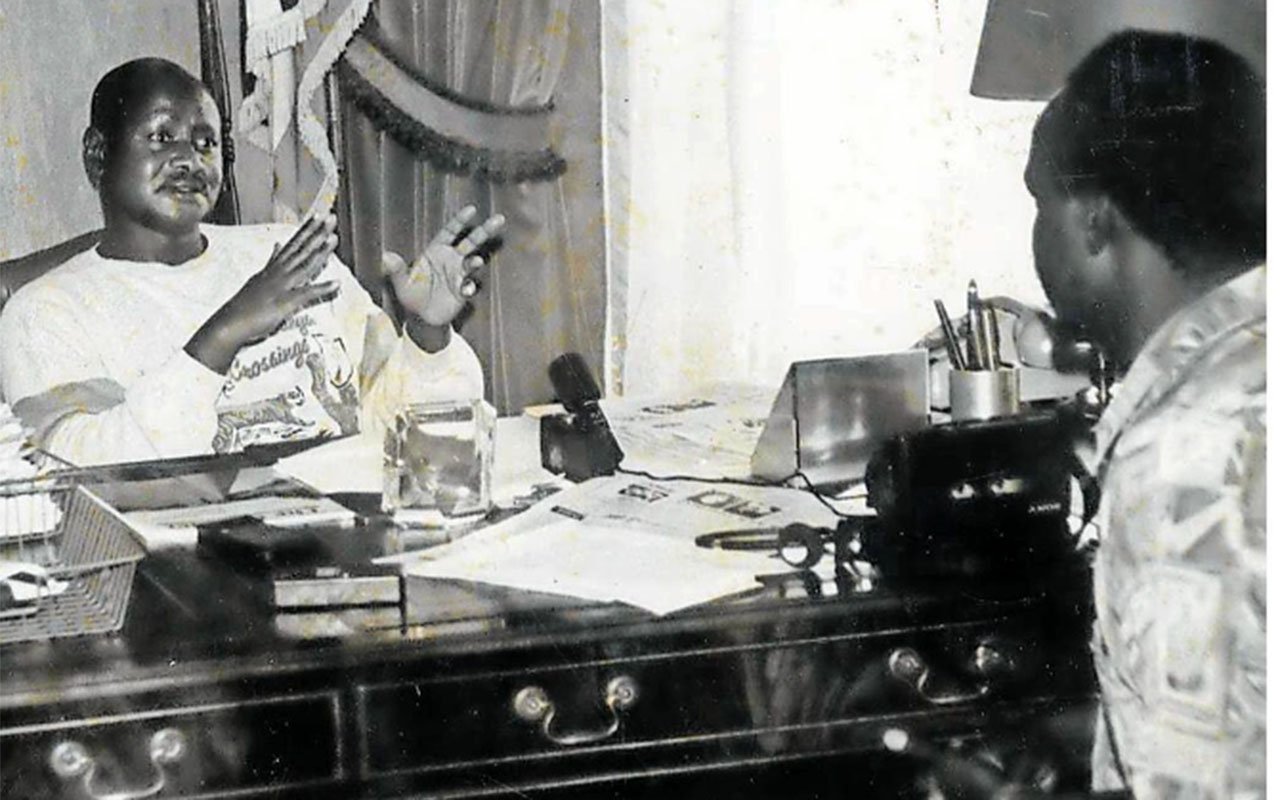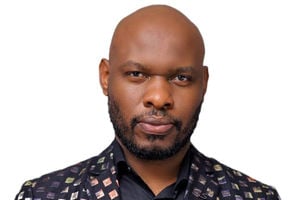Prime
Are Gen Tumwine’s calls to Museveni for change too little, too late?

Former minister for Security, Gen Elly Tumwine (left) with President Museveni. PHOTOS/ FILE
What you need to know:
- Will Gen Elly Tumwine, in light of a long list of those who have ended up as political casualties, not be putting himself in the line of fire if he went on to “advise” President Museveni to quit power given that such advice amounts to courting trouble? Isaac Mufumba find out.
Last month, former minister for Security, Gen Elly Tumwine, announced shortly after handing over office to his successor, Maj Gen Jim Muhwezi, that his first task on assuming the office of Senior Presidential Advisor will be to advise his Bush War comrade and former boss, to prepare for a smooth transition of power for “long-term stability of the country”.
In announcing the task he had arrogated himself, the General who distinguished himself more for his love for music and strokes of paint brush than soldiering, but one who has also been the longest serving representative of the Uganda Peoples’ Defence Forces (UPDF) in Parliament, said the aim was to save Mr Museveni, who will by 2026 have ruled over Uganda a record 40 years, from the hubris syndrome.
The hubris syndrome describes a disorder of the possession of power, particularly power which has been associated with overwhelming success, held for a period of years and with minimal constraint on the leader.
Mr Museveni has until now been very cagey when it comes to discussing matters succession. The closest indicator of his thoughts on the matter came out on June 4 when he in his State-of-the-Nation address said “descendants” of fighters of the NRA fighters have since come of age to assume positions that will drive the country forward.
“I have been discussing with my children, who are now senior adults, the timeliness of creating the DRA (the Descendants’ Resistance Army I) to take forward the work of the original NRA of their parents,” Mr Museveni said.
Beyond that talk there has been very little in terms of signs to suggest that he or the NRM is doing anything in line with putting a succession plan into motion.
Most watchers argue that Mr Museveni and the NRM’s top honchos are afraid that such a discussion might split the party loyalty between an anointed successor and those who might be harbouring ambitions of taking over from Mr Museveni through a normal political process.
Mr Richard Todwong, the NRM secretary general, is however, dismissive of the argument. He argues that it is a question of timing.
“We are not afraid of discussing it (succession). We shall discuss it at the right time. The President has just been re-elected and we are looking forward to formation of the next government. There is no situation that warrants such a discussion,” Mr Todwong told Sunday Monitor in a previous interview.
Dr Kisekka Ntale, a researcher and political economist, does not agree with Mr Todwong. He argues that this is as good a time as any to discuss the matter.
“Succession (transfer of power) debate should be happening in a very structured manner within the multiparty dispensation. The party should have a hand in this. See it from the core of the party. However, in our own context of politics of research, it is not likely that the situation is going to be like that,” Dr Ntale says.
Looked at from what Dr Ntale says, Gen Tumwine’s comments have only served to increase pressure on the President to discuss the matter even when he is not ready or willing. But was Gen Tumwine serious about this? Or was he calling a bluff?
Opinion on this is divided. Hajj Abdul Nadduli, a former minister without portfolio who is also a Senior Presidential Advisor, thinks that Gen Tumwine is not calling a bluff.
“I know Gen Tumwine as a Bush War fighter and one that has worked in the government for a very long time. I am, therefore, 70 per cent sure that he knows what he is saying and committing himself to do,” Mr Nadduli says.
Hajj Nadduli, a former NRA fighter who retired from the army at the rank of Lieutenant was to later serve as LC5 chairperson of Luweero District and NRM Vice Chairperson for Central Region says history might be instructive.

Outgoing Security minister, Gen Elly Tumwine. PHOTOS/ FILE
“If you are a student of our history and you at the time see how things are moving you might want to help your nation avoid falling into a state of anarchy. Nations whose presidents stay in power for a very long often have to undergo another revolution in order to have meaningful change. If he is looking at things in that way, he might be arguing that, won’t we be endangering our people if there is no peaceful and harmonious transition?” Nadduli argues.
Prof Sabiiti Makara, who teaches Political Science at Makerere University, is however, of the view that Gen Tumwine is not serious about offering that kind of advice.
It is believed by many that Mr Museveni’s advisors never advise him on anything at all. Prof Makara believes that a similar fate awaits Gen Tumwine.
“There is scarcely any advice that any of the advisors has given him (Mr Museveni). Everybody knows that the advisors are kept there to earn a salary, but they rarely advise him. So I don’t see any advice Tumwine will be rendering to him. He will get to be there as an advisor who does not advise,” Prof Makara says.
Not the first
Should Gen Tumwine confound Prof Makara, he will not be the first person to have raised the matter of the need for Mr Museveni to preside over a smooth transition and peaceful handover of power.
The calls have been made in both the public domain and in the quiet of the corridors of State House and other facilities where long-time associates of the President have been making similar calls.
Sunday Monitor has learnt that the late First Deputy Prime Minister and Minister for East African Affairs, Ali Kirunda Kivejinja, who passed away on December 19 last year, had been nudging Mr Museveni to bring down the curtail on his stay in power and handover to a younger person.
“That way, he would still be able to continue ruling, albeit behind the scenes and it would ensure that the NRM would stay in power in Uganda for a very long time just like Chama Cha Mapinduzi (CCM) has been able to do in Tanzania,” one of the late Kirunda’s nephews told Sunday Monitor on condition that his identity is not revealed.
Kirunda was not alone. It is understood that former Prime Minister Kintu Musoke, who also serves as a presidential advisor, has on several occasions urged Mr Museveni to call it quits.
It would be understandable that those attempts have hardly made it into the public domain. Mr Museveni has proven over the years that he does not take prisoners when it comes to colleagues who either publicly criticise the actions and direction of the revolution or those that publicly engage him on the need to bow out of the ring.
Those who have tried to go down that road have often been declared undisciplined for discussing matters in a wrong forum.

This list is quite long. In March or April 2003, Gen Henry Tumukunde joined ministers Eriya Kategaya, Bidandi Ssali, Miria Matembe and Sarah Kyingi at a retreat at the National Leadership Institute (NALI) Kyankwanzi in opposing plans to lift presidential term limits on grounds that it would be a contravention of the constitutional order and rights that the NRM/A had fought for.
Mr Museveni’s patience ran out in a May 2003 meeting of the Movement Parliamentary Caucus at the International Conference Centre when Mr Bidandi Ssali asked him why he was working to renege on a promise to quit at the end of what was meant to be his last term in office in 2006.
“Who are you? You are just a mere spoke in the wheel! You can go,” Mr Museveni said.
Mr Bidandi indeed went. He together with Kategaya, Matembe and Kyingi were on May 28, 2005, fired from Mr Museveni’s Cabinet.
Gen Tumukunde was on the same day ejected from Parliament. He also appeared before the Court Martial on charges of military misconduct and spreading harmful propaganda.
Others that broke rank with Mr Museveni over the amendment of the Constitution to remove presidential term limits were Augustine Ruzindana, Jack Sabiiti, Maj John Kazoora, Amanya Mushega, Maj Gen Mugisha Muntu and Mr Mathew Rukikaire.
The list of those who disagreed with Mr Museveni before 2005 had Sam Njuba and Dr Kizza Besigye, while that of those who disagreed with him much later has the likes of Gen David Sejusa, Gen Benon Biraaro and former prime minister Amama Mbabazi.
In the line of fire?
Would Gen Tumwine, in light of such a long list of those who have ended up as political casualties, not be putting himself in the line of fire if he went on to “advise” Mr Museveni to quit given that such advice amounts to courting trouble?
Mr Nadduli believes that Gen Tumwine is sure to render the advice, but that it will not get him into as much trouble as it got the likes of Bidandi Ssali or Miria Matembe into.
“Trouble! What will he do to him? Those are of the same kindred. How many of them have you seen in jail? Those are brothers. They came from the same house. They are the right people to be talking about transition so that they warn their people in the villages that ‘hey folks, it is in your interests that we do this. If we are forced out of power we shall be forced to flee to Congo where we migrated from,” Mr Nadduli says.
Prof Makara on the other hand believes that nothing will happen to Gen Tumwine because he will not be saying anything to stir the hornets’ nest.
“Nothing will happen to him. He will not try. There is no advice that he is going to give. He will just be there,” Prof Makara says.
Gen Tumwine is, however, not your ordinary kind of guy. It was he who shot the first bullet that ignited the five-year Bush War and was the NRA’s first army commander, having taken command after the demise of commander Ahmed Sseguya.
He has also worked with Mr Museveni for a very long time and perhaps understands him much more than very many. Under the circumstances, could his be the first shot of advice that Mr Museveni will listen to in that matter? Or was it just a parting shot?




